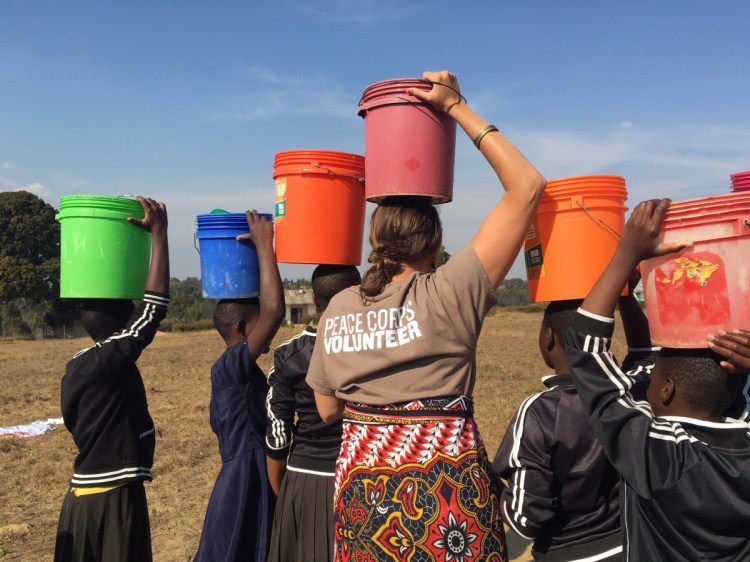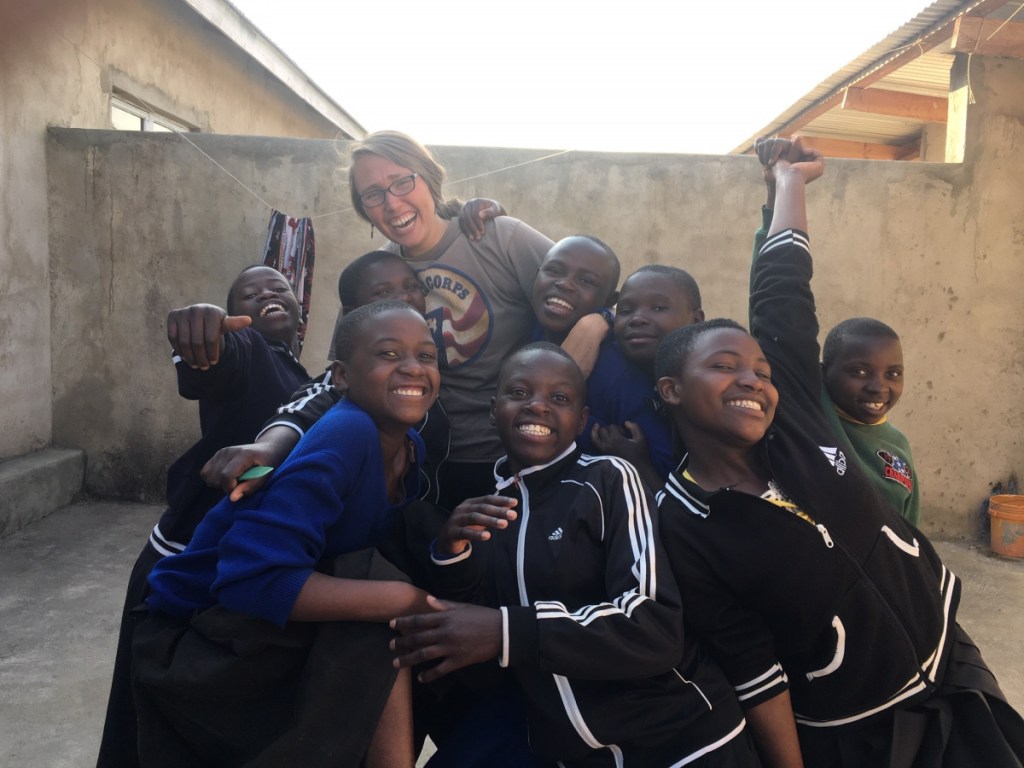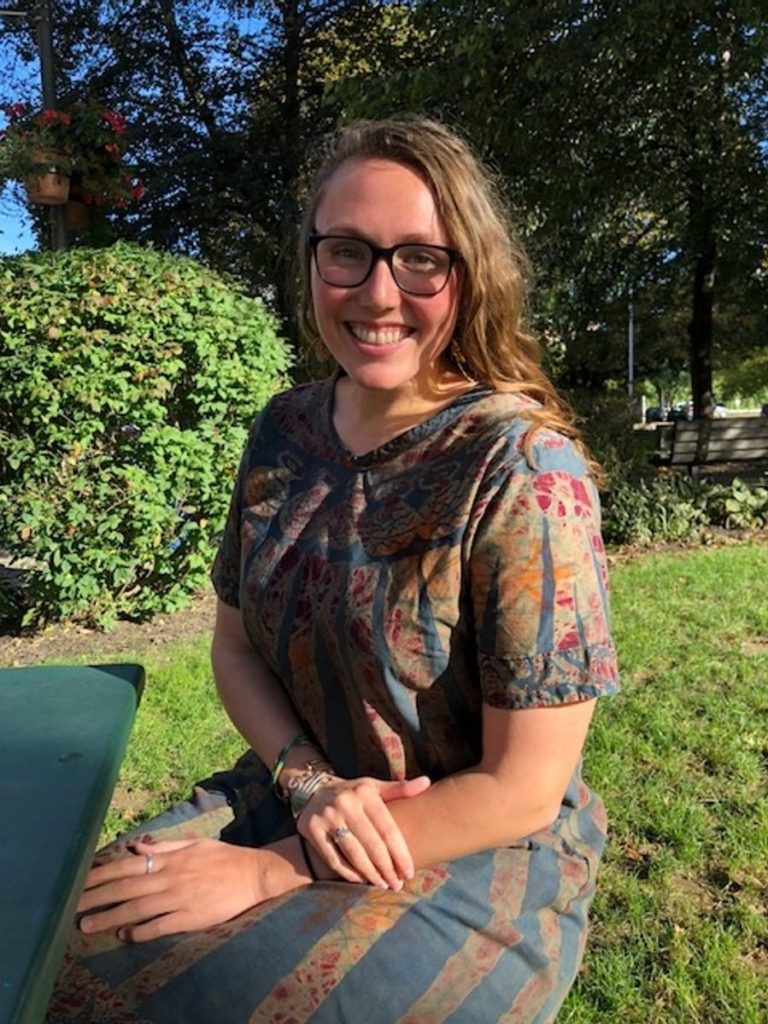Elizabeth Ferry is trying to practice everything she learned while living in Tanzania the last two years — intangible things such as appreciation, kindness and what it means to be human.
“The biggest thing I’m trying to practice is to appreciate the privileges that I have,” she said.
Ferry, 24, a Winslow native, returned to the U.S. three weeks ago from serving in the Peace Corps in East Africa, where she taught English to high-school aged youths.
I interviewed her two years ago before she left. She had just graduated from University of Maine, Farmington, summa cum laude, with a bachelor’s degree in secondary education, with a concentration in English, and had taught Mt. Blue High School students 16 weeks as part of her college experience. She also coached youth basketball and Mt. Blue Middle School boys soccer.
You might say Ferry is coming full circle — she recently landed a half-time job teaching alternative English at Mt. Blue High — but what she will bring to her students is a perspective few educators her age will ever have.
In Tanzania, in East Africa, she taught English, health, wellness and other topics to youths and adults in a small village in the southern highlands region of Iringa.
She lived in a two-room, concrete house with no electricity, running water, refrigerator, stove or toilets and had to walk 20 minutes to fetch water in a bucket. She would return home and filter, boil and bleach the water before drinking it or using it to cook food over a charcoal fire. She ate mostly beans and corn.
When she first arrived in Tanzania, she had immersed herself in the culture by staying for three months with a host family in Tanga, near the city of Dar es Salaam, where she learned how to cook and to use the bathroom, which basically was a hole in the ground. It took her a year to learn the culture and to speak Swahili fluently.
In Iringa, she grew to love her students and the people in her village. Leaving them three weeks ago was the hardest thing she has ever had to do.

Elizabeth Ferry, of Winslow, is seen working with the Peace Corps in Tanzania.
“They were bawling when I left — it was very, very, very, very sad. My heart got ripped out of my chest. It was impossibly difficult to leave them, knowing I may never see them again. They were my family.”
She knew she might never see them again because the death rate is high in Tanzania.
“The HIV rate is very high, malaria is common — disease in general,” she said.
Ferry became ill herself at times, from multiple parasites, bedbugs and general sickness. She was evacuated to a hospital in South Africa because she required surgery for a torn tendon from overuse of her hand and the surgery was not available in East Africa. She also suffered from homesickness.
“Did I miss home? Of course. I had births in my family; I had deaths in my family while I was away. But leaving my students was not an option for me.”
She felt very safe in her village, where she says the villagers had her back and where she learned, first-hand, the meaning of “it takes a village.”
To buy food, she had to travel one and a half hours in an 18-passenger van over dirt roads, another three hours to go to a city, and 15 hours to get to the capital.
Her average class size in Iringa was 60, but she had a class of 90 students. She taught students with dyslexia, and learned braille so she could provide supplemental materials to a student who was blind.
Ferry and another teacher, Meja Kibiki, who was also a father and farmer, taught health and life skills and now the youths can practice the skills on their own.
“I was so proud to be part of it,” Ferry said. “In developing countries, education is the most influential component. My goal was to show kids that they can do anything. I like to say I’m not teaching students — I’m teaching people.”
An animated, hazel-eyed, brown haired woman who is just shy of 6 feet tall, Ferry said she loved her students. She taught them about options — that they could stay in the village and be farmers, or they could choose to move out of the village.”
“I did my best to positively impact kids. That’s what I’d already been doing my whole life as a teacher. In the Peace Corps, I taught English, but I also taught what it is to be an American. I’m a minority group; I’m a woman. I tried to set a good example for my female students and obtain respect from my male students.”
She said teachers in Tanzania are strict and a typical teacher-student relationship does not involve friendship, which she and her students shared.
“I hope my students always remember that I loved them and I cared about them as people — that they were safe in my classroom — that I would never hurt them.”
Ferry learned during her two years in Tanzania that the Peace Corps is the best method of foreign aid, she said. It was hard for her to see missionaries and other volunteers come and go with school supplies and food and sometimes help build a house, while she was trying to create sustainable change and form genuine relationships while being immersed in the culture.

Elizabeth Ferry, of Winslow, served with the Peace Corps in Tanzania.
Such short-term volunteer-ism can be done well, but does not allow for complete understanding, she said.
“You can’t get to know a community in an authentic way and you certainly can’t understand the culture,” she said.
Since returning to the U.S., Ferry, the daughter of John and Beth Ferry, of Winslow, has been visiting schools to teach students about Tanzania. She welcomes the opportunity to visit more classrooms.
“Being able to re-live my experience with American students — nothing will make me happier at this point,” she said.
Meanwhile, she is re-acclimating to American life, excited that she is back in Farmington, a community she loves.
She said being in the Peace Corps sparked her interest in learning more about foods, languages, cultures — and people.
“I learned how much we Americans don’t know that we don’t know,” she said. “I hope to provide a new perspective to my students and encourage them to be more open-minded and aware of all diversity in this wonderful world. I hope to model small, but meaningful things. Appreciating tap water and hot showers. Being patient in traffic jams or electricity outages. And most importantly, continuing to put kindness, silliness and peace on the top of my priority list.”
Amy Calder has been a Morning Sentinel reporter 30 years. Her column appears here Mondays. She may be reached at acalder@centralmaine.com. For previous Reporting Aside columns, go to centralmaine.com.
Copy the Story LinkSend questions/comments to the editors.





Success. Please wait for the page to reload. If the page does not reload within 5 seconds, please refresh the page.
Enter your email and password to access comments.
Hi, to comment on stories you must . This profile is in addition to your subscription and website login.
Already have a commenting profile? .
Invalid username/password.
Please check your email to confirm and complete your registration.
Only subscribers are eligible to post comments. Please subscribe or login first for digital access. Here’s why.
Use the form below to reset your password. When you've submitted your account email, we will send an email with a reset code.